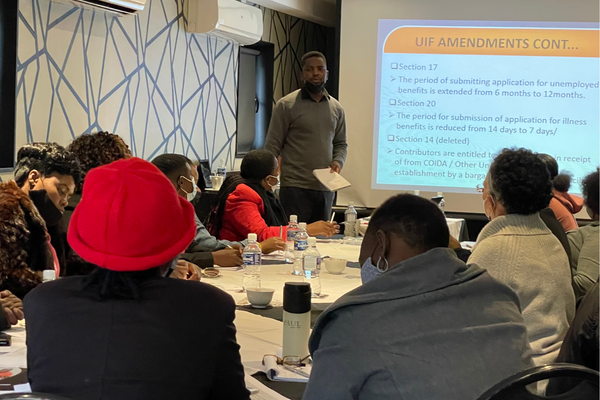The Covid-19 pandemic exposed the extent to which domestic workers are excluded from social protections enjoyed by formally employed workers.
The ILO defines social protection as the set of public measures that the society provides for its members to protect them against economic and social distress.
Social protection includes access to health care and income security, particularly concerning unemployment, sickness, disability, work injury, maternity, old age, or loss of the main income earner for families with children. The Unemployment Insurance Fund (UIF) and the Compensation for Injuries and Diseases Act (COIDA) are examples of social protection insurance in South Africa.
In the country, domestic workers are recognised as employees through several laws which, in many cases, the workers fought for themselves. This means domestic workers can access worker-related benefits. Yet domestic work is still seen as informal work because it happens in private homes, with employers not obliged to provide worker benefits. There is widespread non-compliance with labour laws in the sector. Many of the over 800,000 domestic workers earn less than the national minimum wage and experience poor working conditions, exploitation and abuse.
Domestic workers' organisations demand better access to UIF and COIDA
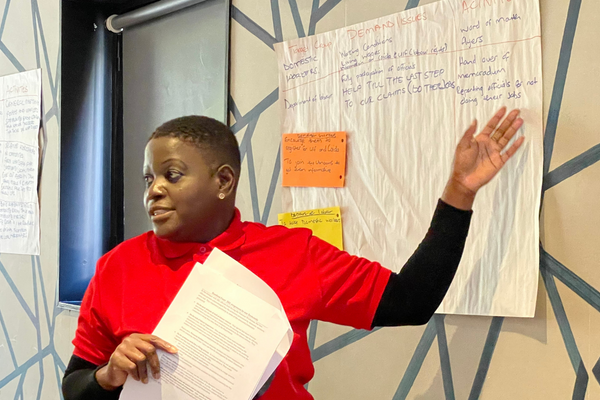
The South African Domestic Service and Allied Workers Union (SADSAWU), the Union of Domestic Workers of South Africa (UDWOSA) and Izwi Domestic Workers Alliance have ramped up advocacy for access to UIF and COIDA so that all workers are covered for future crises. The demands and strategies developed by the workers’ organisations will contribute to improving the social insurance schemes more broadly.
The UIF gives relief to workers when they become unemployed or are not able to work due to maternity, adoption and parental leave, or illness.
COIDA provides compensation to full-time and part-time employees who, as a result of a workplace accident or work-related disease, are either injured, killed or become ill.
Gender lens in social protections
Contributory schemes such as the UIF and COIDA are less likely to benefit women when the schemes are linked to formal employment. Women are over-represented in the more precarious forms of employment and also take huge responsibility for unpaid care work, which causes irregular employment and non-coverage by contributory social insurance schemes. Employed women, on average, earn less than employed men resulting in lower levels of benefits.
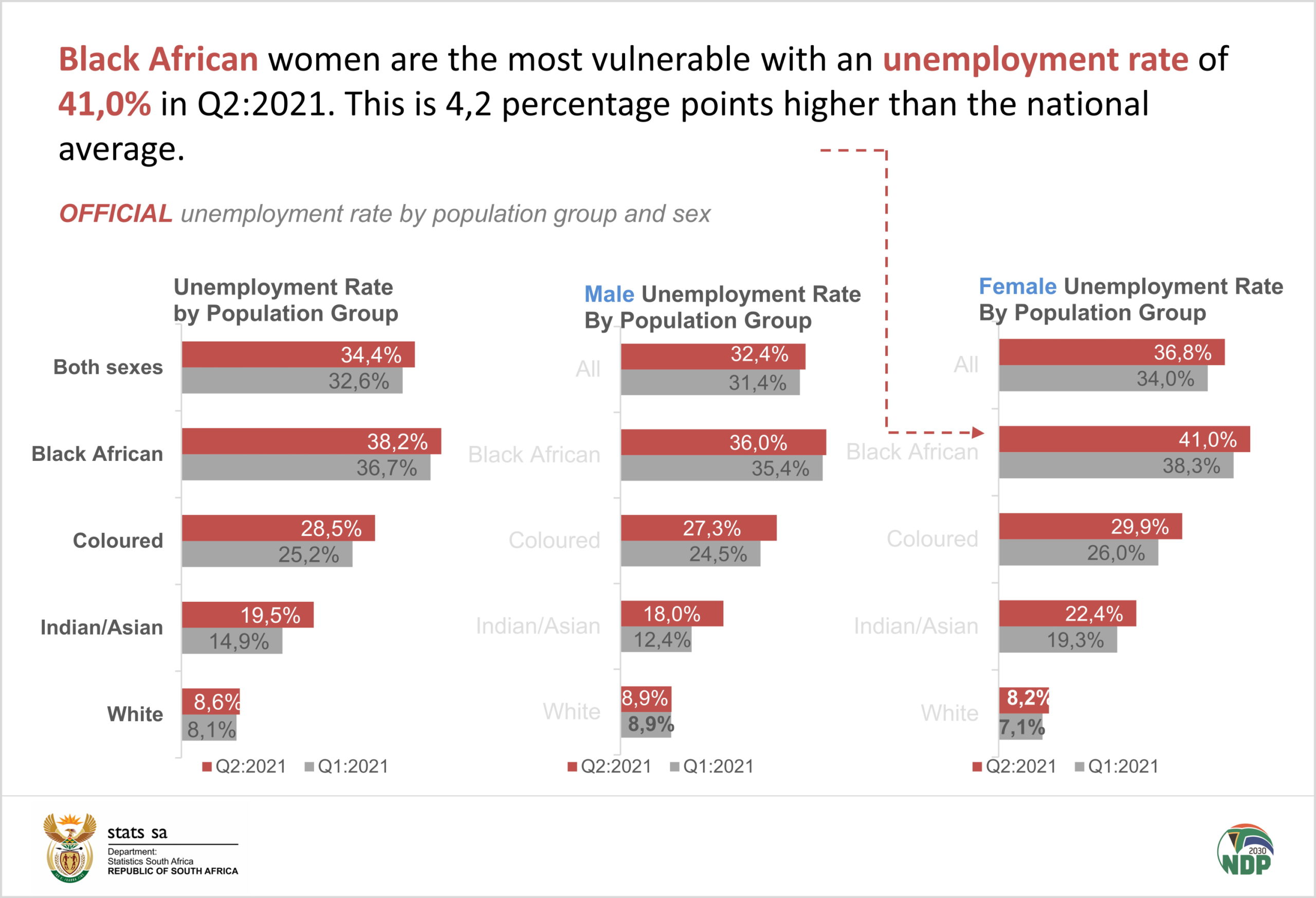
Since 2003 employers of domestic workers are required by law to contribute to the UIF. But to date, very few employers fulfil the legal obligation. The push to have better access by the domestic workers’ organisations has implications for the implementation of COIDA and improvements to the social insurance schemes in general.
Blockages to registering and accessing social insurance
Domestic workers face myriad challenges registering and accessing UIF and COIDA benefits. These stories from domestic workers offer a deeper understanding of the blockages to registering and accessing the benefits:
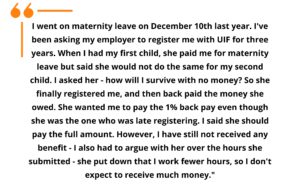
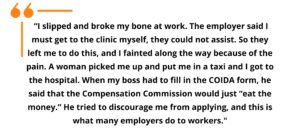

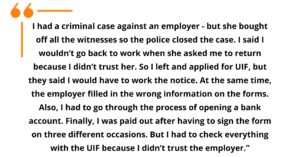
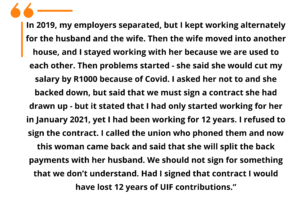
Possible demands and strategies to improve access to UIF and COIDA
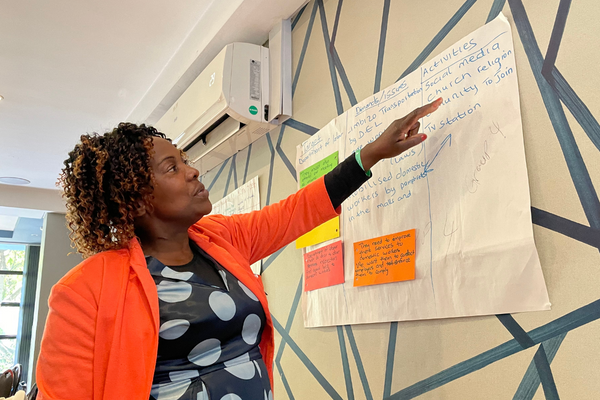
Demand a more user-friendly and improved uFiling system
The Department of Employment and Labour encourages registering and filing of claims on uFiling. However, both employers and employees experience challenges using the online platform. The workers demand a platform that’s easy to use, with efficient data collection and client support.
Encourage education and awareness
Social insurance literacy among informal and invisible workers is one of the biggest obstacles to registration.
The UIF and COIDA can only succeed if both workers and employers know about the schemes, their rights and responsibilities and how to access them. Workers and their employers also need to trust that the schemes are well governed and can deliver the benefits.
The different stakeholders in the labour sector, led by the Department of Employment and Labour, have a role to play in raising awareness and disseminating information about the UIF and COIDA. Key information for campaigns must be simple to grasp, available and accessible to everyone. Domestic worker organisations are well-positioned to provide information and peer learning spaces to their members.
Demand compliance and efficient inspection
Non-compliance with labour laws is widespread, but this is not an argument for saying that UIF and COIDA don’t work.
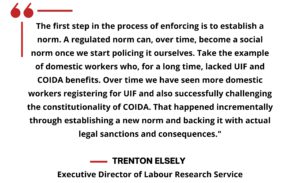
What needs to happen immediately:
- Invest in more trained inspectors to ensure compliance with labour laws.
- Ensure labour inspectors apply best practices when conducting home visits, for example, interviewing both parties in the employment relationship and recording the number of visits made over a specific period.
- Ensure labour inspectors are ethical.
- Have more labour inspectors and commissioners who are women.
Workers’ organisations as monitoring agents
It’s difficult to achieve compliance simply through inspections and inspectors. Worker organisations must take a monitoring role and continue to promote enforcement by speaking out against non-compliance where they see it.
Demand improved services at labour centres
Domestic workers often get treated poorly at the department’s labour centres. To cater for the needs of domestic workers at the centres, the department should consider the following demands:
- Information on registering and applying for UIF/COIDA benefits is in a language that can be easily understood by domestic workers.
- Labour centres are easily accessible to domestic workers.
- Domestic workers have support filling out benefits application forms.
- Staff at labour centres are trained to support domestic workers. Training content is developed in consultation with domestic workers.
Improve the claims and payout systems
- Integrate COIDA and UIF to simplify registration, payment and claims.
- Simplify benefits calculation and have a transparent process.
- Ensure that the domestic worker verifies the information provided by the employer.
- Enforce retrospective compensation for COIDA and allow applications for claims where employers are not contactable.
- Use SMS to communicate instead of demanding the physical presence of a domestic worker seeking updates.
- A toll-free call centre dedicated to domestic workers.
Build alliances with other vulnerable workers, and within the trade union movement and social partners to support high-level advocacy
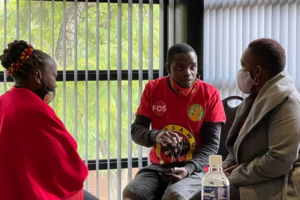
The work done by domestic workers so far
IZWI
In 2018, co-produced a guide for domestic workers that explains labour laws and gives practical advice on how domestic workers can work with employers.
Produced a guide for employers, together with the Socio-Economic Rights Institute (SERI).
Izwi members have also been trained as labour rights educators and are currently training members as gender-based violence lay counsellors.
UDWOSA
Has a strong focus on advocacy and building alliances with employer organisations, including Yes Domestics and the National Employers Association of South Africa, and Injured workers advocacy groups (Injured Workers Action Group – IWAG), as well as the Department of Employment and Labour.
SADSAWU
Has developed booklets, pamphlets and Whatsapp group committees on organising.
Has worked with SERI on research.
Recently worked with COSATU, the Social Law Project and the ILO to produce an educational video and pamphlet on COIDA.
SADSAWU and UDWOSA are working on digital training using Google School.
Useful resource
______
#The UIF/COIDA advocacy project of domestic workers’ organisations is funded by UN Women and by supported by The Neil Aggett Labour Studies Unit, Women in Informal Employment: Globalising and Organising (WIEGO) and the Labour Research Service.


